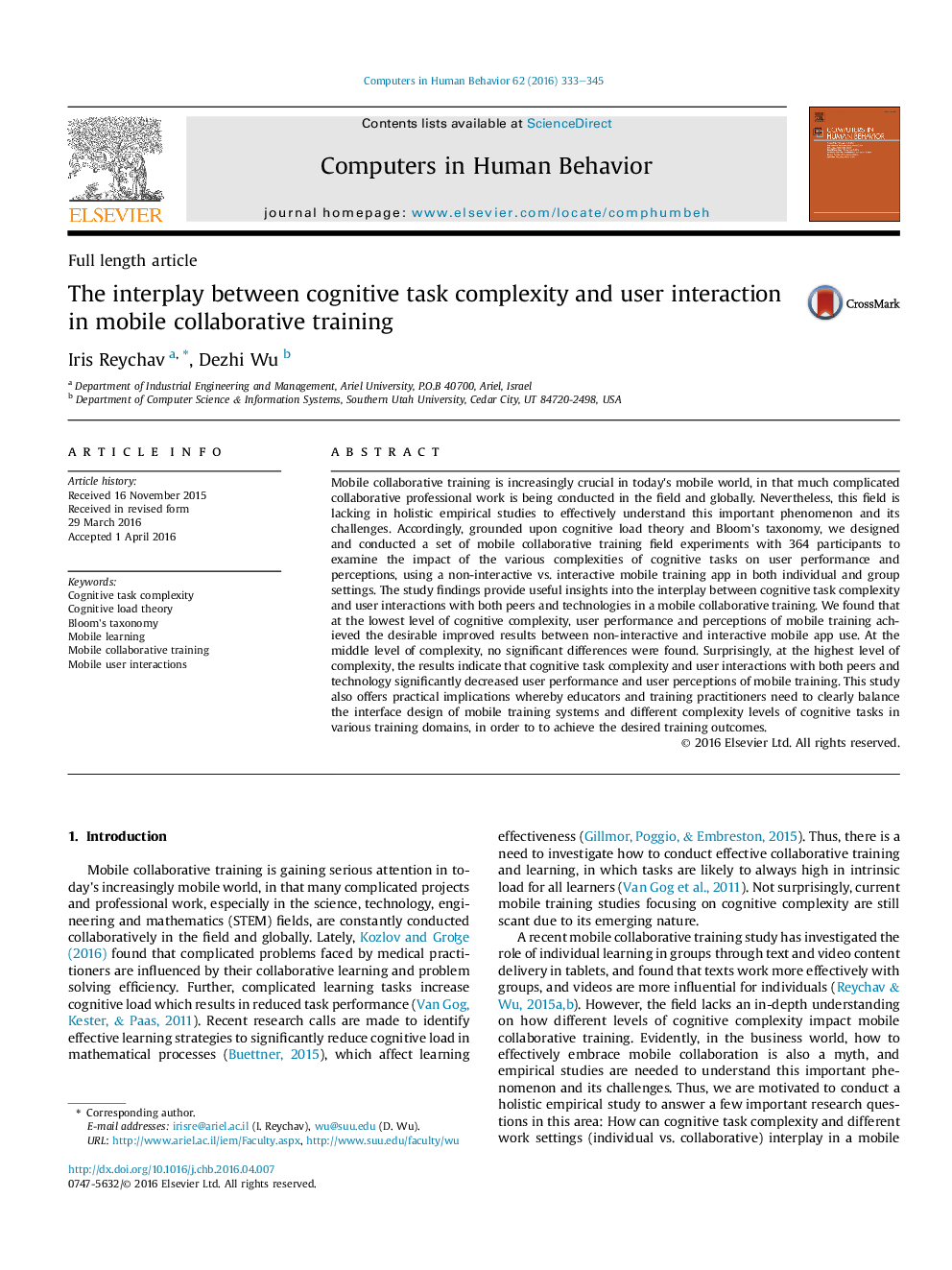| کد مقاله | کد نشریه | سال انتشار | مقاله انگلیسی | نسخه تمام متن |
|---|---|---|---|---|
| 6836849 | 618423 | 2016 | 13 صفحه PDF | دانلود رایگان |
عنوان انگلیسی مقاله ISI
The interplay between cognitive task complexity and user interaction in mobile collaborative training
ترجمه فارسی عنوان
تعامل بین پیچیدگی وظیفه شناختی و تعامل کاربر در آموزش مشترک مشترکین
دانلود مقاله + سفارش ترجمه
دانلود مقاله ISI انگلیسی
رایگان برای ایرانیان
کلمات کلیدی
پیچیدگی وظیفه شناختی، نظریه بار شناختی، طبقه بندی بلوم، یادگیری موبایل آموزش مشارکتی موبایل تعاملات کاربر تلفن همراه،
ترجمه چکیده
آموزش مشترک مشترک موبایل در جهان امروز تلفن همراه بسیار مهم است، در این کار بسیار پیچیده حرفه ای همکاری در زمینه و در سطح جهانی انجام می شود. با این وجود، این زمینه در مطالعات تجربی جامع برای فهم این پدیده مهم و چالش های آن وجود دارد. بر این اساس، بر اساس نظریه بار شناختی و طبقه بندی بلوم، ما مجموعه ای از آزمایشات میدانی در زمینه آموزش مشترک مشترک با 364 شرکت کننده را برای بررسی تأثیر پیچیدگی های مختلف وظایف شناختی بر عملکرد و درک کاربر، با استفاده از یک غیر تعاملی در مقابل تعاملی برنامه آموزش تلفن همراه در هر دو تنظیمات فردی و گروهی. یافته های این تحقیق، بینش مفیدی را از پیچیدگی کار شناختی و تعاملات کاربر با همسالان و تکنولوژی ها در یک آموزش مشارکتی همراه ارائه می دهد. ما دریافتیم که در کمترین سطح پیچیدگی شناختی، عملکرد کاربر و ادراکات آموزش موبایل به نتایج مطلوب بهبود یافته بین استفاده از برنامه های غیر تعاملی و تعاملی تلفن همراه دست یافتند. در سطح متوسط پیچیدگی، تفاوت معنی داری مشاهده نشد. به طور شگفت انگیز، در بالاترین سطح پیچیدگی، نتایج نشان می دهد پیچیدگی وظیفه شناختی و تعاملات کاربر با همسالان و تکنولوژی به طور قابل توجهی عملکرد کاربر و درک کاربران از آموزش تلفن همراه را کاهش داده است. این مطالعه همچنین مفاهیم عملی را ارائه می دهد که در آن مدرسان و تمرینکنندگان آموزش باید به طور واضح طراحی رابط طراحی سیستم های آموزش تلفن همراه و سطوح پیچیدگی های مختلفی از وظایف شناختی در حوزه های آموزشی مختلف را به منظور دستیابی به نتایج آموزشی مورد نظر تقسیم کنند.
موضوعات مرتبط
مهندسی و علوم پایه
مهندسی کامپیوتر
نرم افزارهای علوم کامپیوتر
چکیده انگلیسی
Mobile collaborative training is increasingly crucial in today's mobile world, in that much complicated collaborative professional work is being conducted in the field and globally. Nevertheless, this field is lacking in holistic empirical studies to effectively understand this important phenomenon and its challenges. Accordingly, grounded upon cognitive load theory and Bloom's taxonomy, we designed and conducted a set of mobile collaborative training field experiments with 364 participants to examine the impact of the various complexities of cognitive tasks on user performance and perceptions, using a non-interactive vs. interactive mobile training app in both individual and group settings. The study findings provide useful insights into the interplay between cognitive task complexity and user interactions with both peers and technologies in a mobile collaborative training. We found that at the lowest level of cognitive complexity, user performance and perceptions of mobile training achieved the desirable improved results between non-interactive and interactive mobile app use. At the middle level of complexity, no significant differences were found. Surprisingly, at the highest level of complexity, the results indicate that cognitive task complexity and user interactions with both peers and technology significantly decreased user performance and user perceptions of mobile training. This study also offers practical implications whereby educators and training practitioners need to clearly balance the interface design of mobile training systems and different complexity levels of cognitive tasks in various training domains, in order to to achieve the desired training outcomes.
ناشر
Database: Elsevier - ScienceDirect (ساینس دایرکت)
Journal: Computers in Human Behavior - Volume 62, September 2016, Pages 333-345
Journal: Computers in Human Behavior - Volume 62, September 2016, Pages 333-345
نویسندگان
Iris Reychav, Dezhi Wu,
